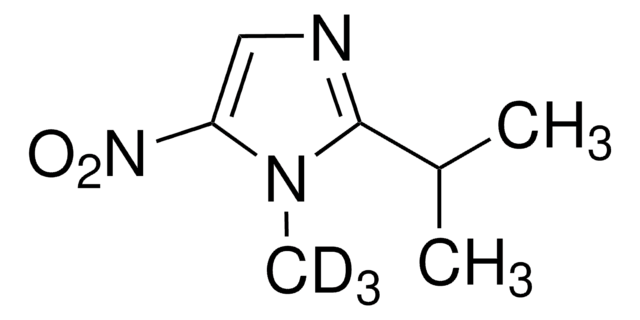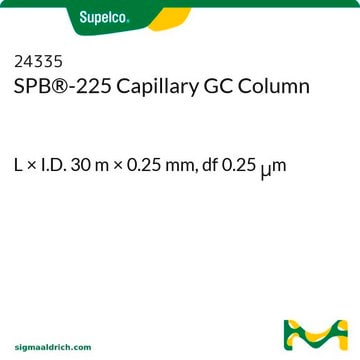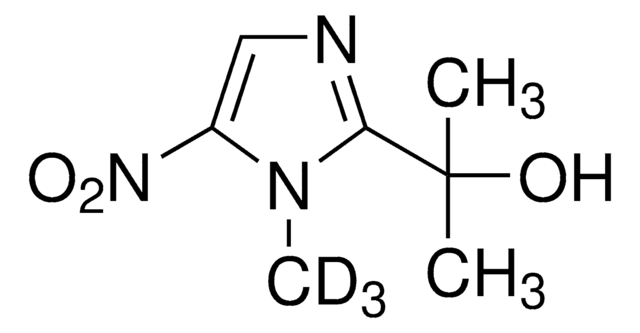34217
Ronidazole-d3
VETRANAL®, analytical standard
Synonym(s):
2-(Carbamoyloxymethyl)-1-methyl-d3-5-nitro-imidazole
Sign Into View Organizational & Contract Pricing
All Photos(2)
About This Item
Empirical Formula (Hill Notation):
C6D3H5N4O4
CAS Number:
Molecular Weight:
203.17
MDL number:
UNSPSC Code:
41116107
PubChem Substance ID:
NACRES:
NA.24
Recommended Products
grade
analytical standard
Quality Level
product line
VETRANAL®
shelf life
limited shelf life, expiry date on the label
technique(s)
HPLC: suitable
gas chromatography (GC): suitable
application(s)
clinical testing
format
neat
mass shift
M+3
SMILES string
[2H]C([2H])([2H])n1c(COC(N)=O)ncc1[N+]([O-])=O
InChI
1S/C6H8N4O4/c1-9-4(3-14-6(7)11)8-2-5(9)10(12)13/h2H,3H2,1H3,(H2,7,11)/i1D3
InChI key
PQFRTXSWDXZRRS-FIBGUPNXSA-N
Application
Refer to the product′s Certificate of Analysis for more information on a suitable instrument technique. Contact Technical Service for further support.
Ronidazole-d3 may be used internal standard in the determination of avermectins, benzimidazoles and nitroimidazoles residues in bovine muscle tissue using ultra-high performance liquid chromatography coupled with mass spectrometry (UHPLC/MS-MS).
Legal Information
VETRANAL is a registered trademark of Merck KGaA, Darmstadt, Germany
Storage Class Code
11 - Combustible Solids
WGK
WGK 2
Personal Protective Equipment
dust mask type N95 (US), Eyeshields, Gloves
Choose from one of the most recent versions:
Already Own This Product?
Find documentation for the products that you have recently purchased in the Document Library.
Jèssica Subirats et al.
Molecular ecology, 26(20), 5567-5581 (2017-08-10)
Wastewater discharges introduce antibiotic residues and antibiotic-resistant bacteria (ARB) into surface waters. Both inputs directly affect the streambed resistome, either by exerting a selective pressure that favour the proliferation of resistant phenotypes or by enriching the resident communities with wastewater-associated
Belinda Huerta et al.
The Science of the total environment, 634, 542-549 (2018-04-11)
Fish are good indicators of aquatic environment pollution because of their capability to uptake pollutants contained in water. Therefore, accumulation of pharmaceutical compounds in freshwater and marine fish and other aquatic organisms has been studied extensively in the last decade.
Multiresidue method for identification and quantification of avermectins, benzimidazoles and nitroimidazoles residues in bovine muscle tissue by ultra-high performance liquid chromatography tandem mass spectrometry (UHPLC-MS/MS) using a QuEChERS approach
Silva DRG, et al.
Talanta, 171, 307-320 (2017)
Salomé Martínez-Morcillo et al.
International journal of hygiene and environmental health, 223(1), 10-21 (2019-11-11)
This study assessed the presence of 27 pharmaceutically active compounds belonging to common therapeutic groups (cardiovascular, antiashmatic, psychoactive, diuretic, analgesic/anti-inflammatory, and antibiotic drugs) in the tissues of representative seafood species of bivalves, cephalopods, arthropods, and fish of high economic importance
Sara Rodriguez-Mozaz et al.
Environment international, 140, 105733-105733 (2020-05-01)
A comprehensive monitoring of a broad set of antibiotics in the final effluent of wastewater treatment plants (WWTPs) of 7 European countries (Portugal, Spain, Ireland, Cyprus, Germany, Finland, and Norway) was carried out in two consecutive years (2015 and 2016).
Our team of scientists has experience in all areas of research including Life Science, Material Science, Chemical Synthesis, Chromatography, Analytical and many others.
Contact Technical Service








